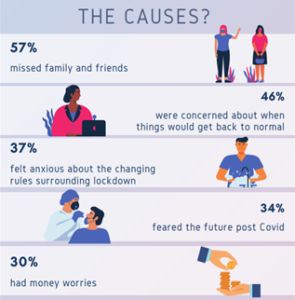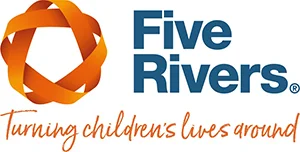Stress Awareness Month
Wednesday 07 April 2021
Last updated: Wednesday 30 March 2022
Written by Katharine Anderson
Since 1992, Stress Awareness Month has been held every April with the aim to increase public awareness about both the causes and alleviators of stress. Stress is considered to be one of the greatest public health challenges of our time, due to the impact it can have upon both our physical and mental health. The more awareness we can create about stress and the more open we can be in our experiences of it can lessen these impacts. Creating a culture that normalises experiences of stress can be incredibly supportive.
 It is important to recognise that some stress can be helpful. When we are exposed to a new, novel situation, we can become tolerant of it. Our response to that situation becomes muted, which allows something to become familiar. If we were unable to tolerate a familiar experience, it would always appear overwhelming, as we would become sensitised to it – and with that sensitisation grows a response. Additionally, our bodies systems allow us to recognise what we need to become sensitised to, to keep ourselves safe and respond appropriately. For example, if we were exposed to a poisonous snake, and we know of the danger around this reptile, it would be natural to become sensitised in response. Such a response would trigger us to slowly retreat to a safer place or position. The experience of seeing the snake is the stressor, with the impact on the system (the bodily system) being the stress. Without experiencing stress, our systems would not know there is something new to attend to, or something old that we are familiar with. Stress can help us identify, separate, and respond to stimuli we are faced with. Stress is not always bad.
It is important to recognise that some stress can be helpful. When we are exposed to a new, novel situation, we can become tolerant of it. Our response to that situation becomes muted, which allows something to become familiar. If we were unable to tolerate a familiar experience, it would always appear overwhelming, as we would become sensitised to it – and with that sensitisation grows a response. Additionally, our bodies systems allow us to recognise what we need to become sensitised to, to keep ourselves safe and respond appropriately. For example, if we were exposed to a poisonous snake, and we know of the danger around this reptile, it would be natural to become sensitised in response. Such a response would trigger us to slowly retreat to a safer place or position. The experience of seeing the snake is the stressor, with the impact on the system (the bodily system) being the stress. Without experiencing stress, our systems would not know there is something new to attend to, or something old that we are familiar with. Stress can help us identify, separate, and respond to stimuli we are faced with. Stress is not always bad.
Stress and the Pandemic
Given the past year, it is unsurprising to hear that stress has seeped more strongly into peoples lives. In a research study completed by the Mental Health Foundation, it was discovered that 74% of adults have ‘felt so stressed at some point over the last year’ that they felt ‘overwhelmed or unable to cope’. In a study conducted in collaboration with Huawei, the Stress Management Society found the three key# causes for concern when it comes to stress are feelings of disconnection, uncertainty, and a worrying loss of control. These three areas have been experienced largely by adults, young people, and children since the COVID-19 restrictions began in March 2020. Given the enormity of the pandemic and the impact, it has had upon us individually, collectively, and as a global entity, these feelings and increases in anxieties are a completely normal response to an entirely abnormal situation.
Mental Health Foundation, it was discovered that 74% of adults have ‘felt so stressed at some point over the last year’ that they felt ‘overwhelmed or unable to cope’. In a study conducted in collaboration with Huawei, the Stress Management Society found the three key# causes for concern when it comes to stress are feelings of disconnection, uncertainty, and a worrying loss of control. These three areas have been experienced largely by adults, young people, and children since the COVID-19 restrictions began in March 2020. Given the enormity of the pandemic and the impact, it has had upon us individually, collectively, and as a global entity, these feelings and increases in anxieties are a completely normal response to an entirely abnormal situation.
What can we do to decrease our experience of stress?
A good place to start is to identify your sources of stress. This may feel tricky in terms of where to start. An idea is to break your sources of stress into areas, such as your environment, your finances, your relationships, your body, and your job. You will probably find as you think about each individual group that there are lots of overlap or connections between the categories. Once you have identified your concerns, you can choose to tackle one area or one individual thing at a time. The Stress Management Society have designed a list of the signs of stress for reference. Additionally, they have a free stress test, that can be found here.
Identify and reclaim your power. For example, you may acknowledge that a job-related stressor is your workload, which may feel overwhelming. From here think about what is in your control. What can you do, versus what do you need someone’s support with? In this scenario, you may reclaim your power by organising your diary or chunking your work and keeping to your work hours boundary – no early starts or working past the close of play. That is what you can control. Where you may need support (and what therefore may be out of your control) is the workload coming in.
Tune in to what is going on for you. How are you feeling? Lonely? Happy? Content? Tired? Listen to your body. Are you getting enough rest? Are you eating when you are hungry? Are you in balance with what you need right now? Reclaim your power here too.
As identified above, 57% of people in the survey for the Mental Health Foundation identified that they missed family and friends. Maintaining our social networks is of vital importance for our well-being. Reach out to friends, family, colleagues when you are feeling like increasing your sociability and create space for these interactions in which you can be distraction-free. Being present in the moment will enhance these experiences.
How to unlock your happy
The Stress Management Society has highlighted how we can maximise our brain chemicals and endorphins – our feel-good emotions – to enhance our wellbeing and decrease our experiences of stress.
| Serotonin – The Mood Stabiliser | Dopamine – The Reward Chemical |
| · Get outside in nature
· Have a massage · Practice breathing exercises (examples can be found in the A&T newsletter) · Practice daily gratitude (what 3 things are you grateful for today?) · Aerobic exercise – getting that heart rate pumping! |
· Celebrate successes
· Get enough sleep · Practise mindfulness or meditation · Listen to music · Get plenty of vitamin D – spend time out in the sun (safely) where you can |
| Endorphins – The Pain Killer | Oxytocin – The Love Hormone |
| · Creative activities
· Laughter · Eat cacao rich foods · Complete Random acts of Kindness · Take a hot salt bath |
· Practise yoga
· Cuddles and hugs · Pet a dog · Tell someone how much you care · Spend time with friends and family |
Other resources which may be of interest
- ‘Taking you from Distress to De-stress – A Guide 2021’ – https://www.stress.org.uk/wp-content/uploads/2021/02/The-SMS-Branded-Stress-Guide-2021.pdf
- Ikigai survey – https://ikigaisurvey.questionpro.com/
- Stress Relief Adult Colouring Book – https://www.stress.org.uk/wp-content/uploads/2020/04/Stress-Relief-Adult-Colouring-Book-%C2%A9-Sam-Antolik-2020.-All-rights-reserved.pdf
